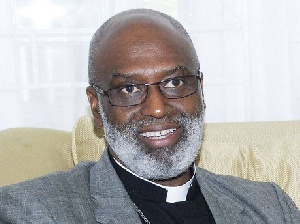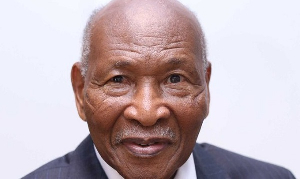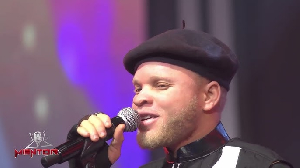- Home - News
- TWI News | TV
- Polls
- Year In Review
- News Archive
- Crime & Punishment
- Politics
- Regional
- Editorial
- Health
- Ghanaians Abroad
- Tabloid
- Africa
- Religion
- Election 2020
- Coronavirus
- News Videos | TV
- Photo Archives
- News Headlines
- Press Release
General News of Wednesday, 5 November 2014
Source: Daily Guide
Corruption killing Ghanaians – Palmer-Buckle
The Metropolitan Catholic Archbishop of Accra, Charles Gabriel Palmer Buckle, yesterday observed that in spite of the God-given resources at the disposal of the country, Ghanaians are suffering untold hardships because of economic mismanagement and corruption.
He therefore called on civil society organisations (CSOs) and policy think-tanks, particularly the Institute of Economic Affairs Ghana (IEA) to liberate Ghanaians from what he described as the “economic shackles.”
Archbishop Palmer Buckle made the observation in a sermon and exhortation at the 25th Anniversary Celebration of IEA in Accra.
“It seems everything in Ghana is good except Ghanaians,” he said, pointing out the difficult times Ghanaians find themselves in under the John Mahama-led National Democratic Congress (NDC) government.
Archbishop Palmer Buckle stated that “2000 years on after Jesus, we still seem to be faced with the same challenges as in the time of Jesus.”
He blamed the situation on what he described as “blindness in the country,” emphasising further, “there’s so many blindness in the country.”
He explained, “I am not talking about physical blindness. I am talking about intellectual blindness; I am talking about excessive partisanship and misconception of religious thoughts”, adding that those had become shackles that had impeded the liberation of the people.
He elaborated on how countries like Japan and Malaysia among others, with fewer natural resources than Ghana, have out-developed the country as a result of competent leadership.
Board Chairman of IEA, Dr Charles Mensah, in a remark, stated that Ghana was confronted with “weak fiscal management.”
“The economy is weak. We borrow and move on, we borrow and move on,” he observed.
He stated that over the last 25 years, the trend had been “deficit financing and deficit manufacturing. This is the reason for high unemployment and high cost of living.
“Economic policies are not the problem. The problem is the weak institutions and structures that we have in place.”
He further stated that the economy remains colonial in nature.
IEA, Ghana’s first public policy think-tank, was founded in 1989 with a view to broadening the debate on public policy, engendering private sector-led economic growth and strengthening the pillars of democracy.
Its ultimate mission over the years has been to promote good governance, democracy and a fair market economy in Ghana in particular, and Africa as a whole.
Dr Mensah pointed out how relevant the core mandate of the institute had become today.
Going forward, he disclosed, the ultimate goal of the institute in the next five years would be the transformation of Ghana’s economy to an industrialised one.
This, he said, would arrest the nation’s fiscal imbalances and reduce imports.
Speaking to the media, some dignitaries, including Dr Abu Sakara, 2012 presidential candidate of the Convention People’s Party (CPP), commended the IEA for continuously shaping Ghana’s democracy over the years.
In attendance at the ceremony held at the forecourt of the IEA secretariat were the flag bearer of the New Patriotic Party (NPP), Nana Addo Dankwa Akufo-Addo; Freddie Blay, 1st National Vice Chairman of the NPP; Johnson Asiedu Nketia, General Secretary of the NDC and Sherry Ayittey, Minister of Fisheries and Aquaculture.
Others included Kwabena Agyepong, NPP General Secretary; Yaw Osafo-Maafo, former Minister of Education and Sports during the Kufuor administration; Prof Stephen Addei, former Rector of the Ghana Institute of Management and Public Administration (GIMPA) and a tall-list of other dignitaries, including traditional and religious leaders.











